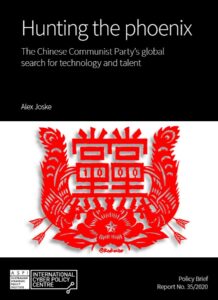 Washington’s best response to Xi Jinping’s increasingly nationalistic and authoritarian China is to adopt an asymmetric approach — revitalizing the relationships that have long anchored U.S. diplomacy while reaffirming democratic values and institutions, according to Cornell University’s Jessica Chen Weiss, the author of “Powerful Patriots: Nationalist Protest in China’s Foreign Relations” and Ali Wyne, a nonresident senior fellow at the Atlantic Council and at the Modern War Institute, and a former Penn Kemble Fellow at the National Endowment for Democracy.
Washington’s best response to Xi Jinping’s increasingly nationalistic and authoritarian China is to adopt an asymmetric approach — revitalizing the relationships that have long anchored U.S. diplomacy while reaffirming democratic values and institutions, according to Cornell University’s Jessica Chen Weiss, the author of “Powerful Patriots: Nationalist Protest in China’s Foreign Relations” and Ali Wyne, a nonresident senior fellow at the Atlantic Council and at the Modern War Institute, and a former Penn Kemble Fellow at the National Endowment for Democracy.
Beijing has tried to turn the coronavirus pandemic into a public relations opportunity. Deflecting criticism about its early handling of the outbreak in Wuhan, it has boasted about its response at home and its exports of personal protective equipment, while criticizing the performance of Western countries. But Beijing’s bragging isn’t playing so well abroad, they write for The Times:
 Some countries aren’t buying the Chinese government’s narrative. Australia, for example, has called for a formal investigation into the origins of the pandemic in China. (Beijing has fought back with sanctions on Australian beef and barley.) China also faces a global backlash for repressing Uighurs and other ethnic minorities, cracking down on Hong Kong, increasing pressure on Taiwan, fighting with India at their disputed border and forcefully pressing its maritime claims in the South China Sea.
Some countries aren’t buying the Chinese government’s narrative. Australia, for example, has called for a formal investigation into the origins of the pandemic in China. (Beijing has fought back with sanctions on Australian beef and barley.) China also faces a global backlash for repressing Uighurs and other ethnic minorities, cracking down on Hong Kong, increasing pressure on Taiwan, fighting with India at their disputed border and forcefully pressing its maritime claims in the South China Sea.
Beijing itself is concerned about the mounting discontent. According to Reuters, a think tank affiliated with the Ministry of State Security warned President Xi Jinping and top officials in April that hostility toward China was at its highest since the 1989 Tiananmen crackdown. RTWT







